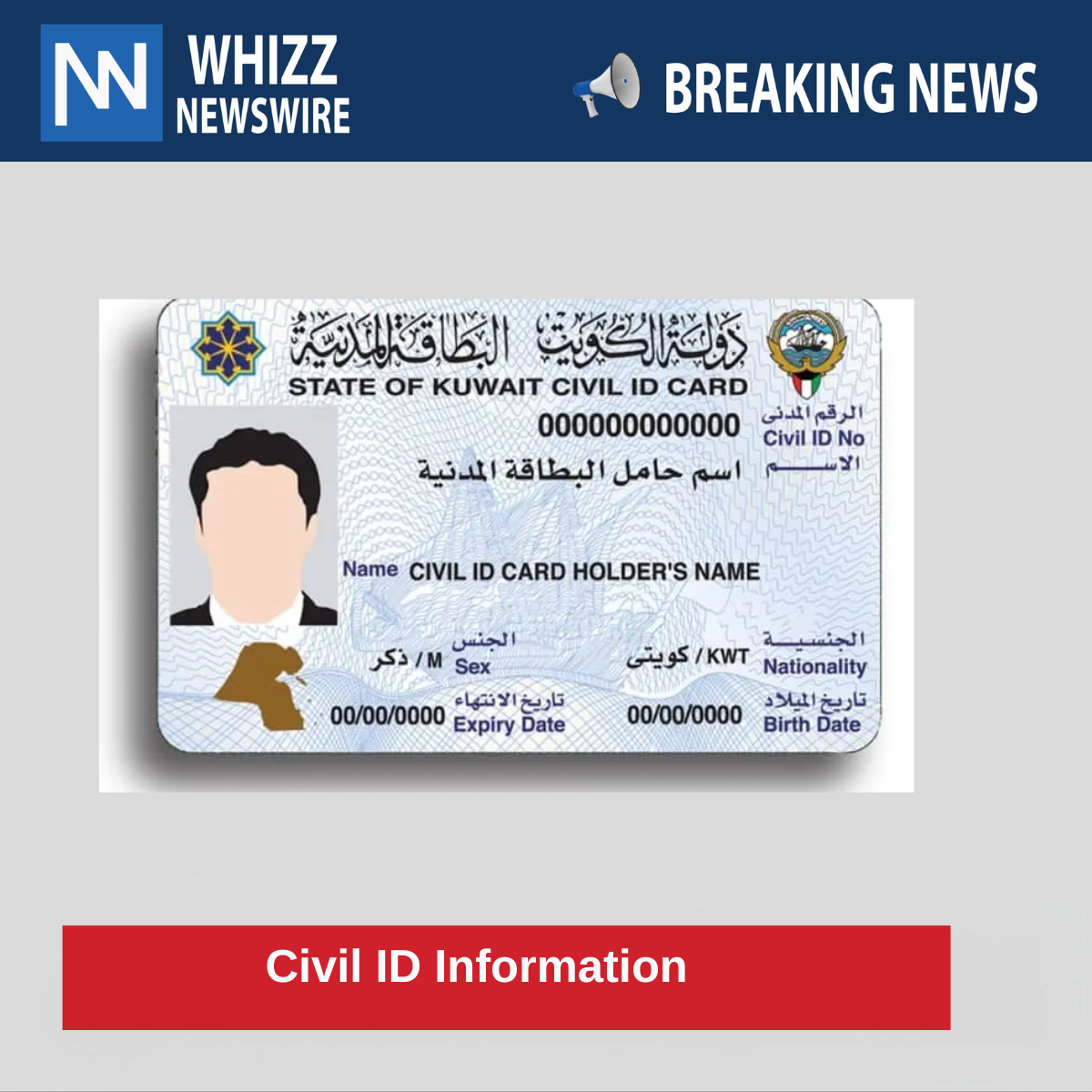In every country, a formal identity document serves as the foundation of how individuals interact with the government, institutions, and services. In Kuwait, that document is known as the Civil ID, or in Arabic, “بطاقة الهوية المدنية”. Issued and maintained by the Public Authority for Civil Information (PACI), the Civil ID is far more than just a card; it is your personal gateway to legal recognition, residency verification, and everyday access to services in the country.
Whether you are a Kuwaiti national or an expatriate living in Kuwait, the Civil ID is essential for all legal, professional, and social functions. In this article, we explore the Civil ID system in full detail: its purpose, structure, how to apply for one, how to renew it, what to do if it’s lost, and why it is so vital in daily life.
What is a Civil ID?
The Civil ID is an official identity card that every resident and citizen of Kuwait must possess. It is issued by the Public Authority for Civil Information (PACI) and functions as the primary identity document in the country. Every individual living in Kuwait be it a citizen, expatriate, or child must have a valid Civil ID, as required by law.
Unlike many other countries where passports or national IDs are used, Kuwait has centralized all identity services through the Civil ID. This single card connects a person’s residency status, address, biometric data, and more.
What Information Is on the Civil ID?
A Kuwaiti Civil ID is a smart card embedded with an electronic chip, and it contains both printed and digital information. Here is a breakdown of what’s included:
Front Side:
- Full name (in Arabic and English)
- Civil ID number (a unique 12-digit number)
- Nationality
- Gender
- Date of Birth
- Photo
- Card Expiry Date
Back Side:
- Full residential address (Governorate, block, street, building, apartment number)
- Sponsor’s name (for expatriates)
- Blood type
- QR code or chip that stores fingerprint, eye scan, and digital signature data
This ID is bilingual and is used in nearly all sectors healthcare, banking, telecommunications, travel, and government offices.
Who Issues the Civil ID?
The Public Authority for Civil Information (PACI) is the only organization in Kuwait responsible for issuing, renewing, and managing Civil IDs. Established in 1982, PACI’s role includes:
- Registering individuals in the civil database
- Managing national address systems
- Updating public records
- Overseeing population statistics
Their official website is: www.paci.gov.kw
Who Needs a Civil ID?
The Civil ID is mandatory for:
- All Kuwaiti nationals
- All expatriate residents (adults and children)
- Newborns born in Kuwait
- Domestic helpers and household workers
- Foreign students and dependents of residents
Even newborn babies must be registered with PACI and issued a Civil ID after receiving a birth certificate and residence permit.
How to Apply for a Civil ID (for Expatriates)
The process for obtaining a Civil ID begins after a person receives legal residency (Iqama). Here’s a step-by-step breakdown for non-Kuwaiti residents:
Step 1: Residency Approval
After arriving in Kuwait, you must secure a residency visa from the Ministry of Interior. This is usually sponsored by your employer, spouse, or guardian.
Step 2: Medical Test and Fingerprinting
Complete a medical examination and go through fingerprinting as required by immigration authorities.
Step 3: Gather Required Documents
You’ll need:
- Valid passport with residency stamp
- Work permit or employment contract
- House rent contract or lease (address proof)
- Sponsor’s civil ID (if applicable)
- A recent passport-sized photo
Step 4: Visit PACI
Visit the PACI headquarters in South Surra (Al-Zahra) or a designated service center to submit your application. In some cases, employers may complete this on your behalf.
Step 5: Pay the Fee
Fees range from 5 KD for regular cards to 10 KD for smart cards.
Step 6: Wait for SMS Notification
Once your card is ready, you will receive an SMS from PACI, informing you when and where to collect it. Processing usually takes a few working days.
Validity and Expiry
The validity of a Civil ID depends on your status:
| Status | Validity Period |
| Kuwaiti Citizens | 10 years |
| Expatriates | 1–2 years |
| Children < 5 yrs | 2 years |
Always check the expiry date printed on the front of the card and make arrangements for renewal at least 1 month before expiry.
How to Renew a Civil ID
Renewal is simple, especially if none of your data has changed. You can do it online through the PACI website:
- Go to: https://www.paci.gov.kw
- Select “Renew Civil ID”
- Enter your Civil Number
- Upload a new photo (if required)
- Pay the renewal fee via KNet
- Wait for the SMS confirmation
If there are changes to your address, sponsor, or name, then an in-person appointment at PACI is required.
What If You Lose Your Civil ID?
Losing your Civil ID can cause serious inconvenience, especially now that it serves as your official residency document.
What to Do:
- Report the loss immediately at the nearest police station
- Visit PACI and submit a replacement request
- Bring valid ID (e.g., passport), sponsor details, and a new photo
- Pay replacement fee (usually KD 20)
- Collect the new card after processing
Civil ID and Digital Residency
As of 2022, Kuwait phased out residency visa stickers in passports. The Civil ID now acts as your sole proof of residency, including for travel.
That means:
- You must carry your Civil ID when entering or leaving Kuwait
- Your passport no longer shows your visa status
- Immigration officers verify your residency via Civil ID at the airport
For travelers and expats, this change makes it even more critical to keep your Civil ID valid and accessible at all times.
Why Is the Civil ID So Important?
In Kuwait, the Civil ID is not just an ID it is your all-access pass to public and private services. Here are some of the key areas where it’s required:
- Travel (airport immigration)
- Healthcare services and insurance
- Banking and financial transactions
- Telecom services (SIM registration)
- University/School admissions
- Driver’s license application
- Car registration
- Rental agreements and utilities
In short: without a valid Civil ID, life in Kuwait becomes difficult.
Civil ID for Children and Newborns
Children under 5 still require Civil IDs, even though their biometric data may not be collected yet. Parents must:
- Obtain a birth certificate
- Register residency with immigration
- Apply to PACI for a Civil ID
These cards are valid for two years, and renewal is the parent’s responsibility.
Final Thoughts
The Civil ID in Kuwait is more than just a government-issued card. It is the central point of identification and legal recognition for everyone in the country. Whether you’re a citizen, an expat, or a child, your Civil ID connects you to the state’s administrative systems, from hospitals and banks to airports and digital services.
As Kuwait moves further into a digital and paperless future, the Civil ID is becoming increasingly powerful. Understanding how it works and keeping it up to date is not just important, it’s essential for daily life.
For similar content visit here




